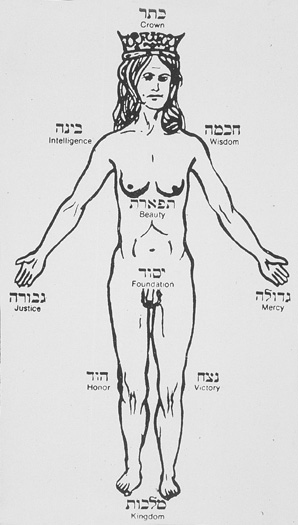Adam Kadmon: Difference between revisions
From AnthroWiki
(Created page with "thumb|[[Adam Kadmon, the cosmic primordial man, is sometimes depicted in androgynous form with both male and female sexual characteristics...") |
No edit summary |
||
| Line 4: | Line 4: | ||
== Literature == | == Literature == | ||
* [[Gershom Scholem]]: '' | * [[w:Gershom Scholem|Gershom Scholem]]: ''On the Kabbalah and its Symbolism''. Revised ed. Edition. Schocken 1996, ISBN 978-0805210514 | ||
* [[Rudolf Steiner]]: ''Geistige Hierarchien und ihre Widerspiegelung in der physischen Welt'', [[GA 110]] (1991), ISBN 3-7274-1100-7 {{Lectures|110}} | * [[Rudolf Steiner]]: ''Geistige Hierarchien und ihre Widerspiegelung in der physischen Welt'', [[GA 110]] (1991), ISBN 3-7274-1100-7 {{Lectures|110}} | ||
* [[Rudolf Steiner]]: ''Die Erkenntnis des Menschenwesens nach Leib, Seele und Geist. Über frühe Erdzustände'', [[GA 347]] (1995), ISBN 3-7274-3470-8 {{Lectures|347}} | * [[Rudolf Steiner]]: ''Die Erkenntnis des Menschenwesens nach Leib, Seele und Geist. Über frühe Erdzustände'', [[GA 347]] (1995), ISBN 3-7274-3470-8 {{Lectures|347}} | ||
Revision as of 05:56, 24 October 2021

Adam Kadmon (also Adam Qadmon, Aramaic: אדם קדמון "original man, cosmic man"; Greek: οὐράνιος ἄνθρωπος uranios anthropos "heavenly man") is understood as the archetype of man according to the statements in the Kabbalah and Haggadah. Its image is the earthly man. The earthly man, however, lost the three wisdoms that place Adam Kadmon at the side of God, namely wisdom, glory and immortality. According to the teachings of the Kabbalah, Adam Kadmon was created even before the actual creation from the pure divine light that emerged directly from the Ain Soph. Adam Kadmon is comparable to the giant Ymir of Norse mythology, the Pangu of Chinese mythology, the Gayomart of Persian mythology or the Purusha of the Indian Vedas.
Literature
- Gershom Scholem: On the Kabbalah and its Symbolism. Revised ed. Edition. Schocken 1996, ISBN 978-0805210514
- Rudolf Steiner: Geistige Hierarchien und ihre Widerspiegelung in der physischen Welt, GA 110 (1991), ISBN 3-7274-1100-7 English: rsarchive.org German: pdf pdf(2) html mobi epub archive.org
- Rudolf Steiner: Die Erkenntnis des Menschenwesens nach Leib, Seele und Geist. Über frühe Erdzustände, GA 347 (1995), ISBN 3-7274-3470-8 English: rsarchive.org German: pdf pdf(2) html mobi epub archive.org
 |
References to the work of Rudolf Steiner follow Rudolf Steiner's Collected Works (CW or GA), Rudolf Steiner Verlag, Dornach/Switzerland, unless otherwise stated.
Email: verlag@steinerverlag.com URL: www.steinerverlag.com. Index to the Complete Works of Rudolf Steiner - Aelzina Books A complete list by Volume Number and a full list of known English translations you may also find at Rudolf Steiner's Collected Works Rudolf Steiner Archive - The largest online collection of Rudolf Steiner's books, lectures and articles in English. Rudolf Steiner Audio - Recorded and Read by Dale Brunsvold steinerbooks.org - Anthroposophic Press Inc. (USA) Rudolf Steiner Handbook - Christian Karl's proven standard work for orientation in Rudolf Steiner's Collected Works for free download as PDF. |
